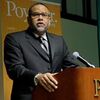Some US states such as Alaska, Georgia, Tennessee, Texas and South Carolina took tentative steps toward reopening from COVID-19-related lockdowns over the weekend. Hair salons, tattoo parlors, retailers and restaurants reopened as governors began easing restrictions in some sectors in an effort to begin to repair the battered economy. How risky is this, and will the public respond?
According to Politico, "Tens of millions of pounds of American-grown produce is rotting in fields as food banks across the country scramble to meet a massive surge in demand, a two-pronged disaster that has deprived farmers of billions of dollars in revenue while millions of newly jobless Americans struggle to feed their families." There’s been an ongoing discussion in this country since its founding: what is the role of government? Conservatives love to advocate for smaller government, less government. Is this is an example of what happens in a country when the government fails?
A Saturday headline in The Grayzone reads: "US elites use Russiagate playbook to blame China and promote hostility." The article states: "The bipartisan US establishment has coalesced around increased hostility to China in response to the coronavirus pandemic. China has faced numerous allegations including that it covered up the pandemic at the world’s expense, developed the virus in a lab, and has spread disinformation." In the midst of a global pandemic, why has China become the new bogeyman, and what are the methods being used to perpetuate this narrative?
There’s a great piece in CounterPunch, entitled “Capitalism Can’t Be Repaired, Coronavirus Shows Its Huge Weaknesses,” wherein the author writes, “Consider this absurdity: The US government’s policy in the face of the current capitalist crash is to 'return the economy to the pre-coronavirus normal.' What? In that 'normal' system, private capitalists maximized profits by not producing the tests, masks, ventilators, beds, etc., needed when coronavirus hit. ... In capitalism, a small minority — employers — makes all the key decisions (what, how, where to produce, and how to use the proceeds) governing production and distribution of most goods and services. The majority — employees and their families — must live with the results of employers’ decisions but are excluded from making them." I thought the market — or as Adam Smith termed it, the "invisible hand" — that people acting in their own self-interest, will eventually help the best interests of the greater public good. What's happening here?
GUESTS:
Ray Baker — Political analyst and host of the podcast Public Agenda.
Shermichael Singleton — Writer, political consultant, and former CNN political commentator.
Rashid Nuri — Founder of the Truly Living Well Center for Natural Urban Agriculture (TLW). TLW is Atlanta’s premier urban agricultural organization, growing tons of chemical-free, nutritious food, providing jobs and educating communities about food, nutrition and self-sufficiency. His new book is titled "Growing Out Loud: Journey of a Food Revolutionary."
Mark Sleboda — International affairs and security analyst.
Dr. Richard Wolff — Professor of economics emeritus at the University of Massachusetts, Amherst, and founder of the organization Democracy at Work, whose latest book is "Capitalism's Crisis Deepens: Essays on the Global Economic Meltdown."
We'd love to get your feedback at radio@sputniknews.com



